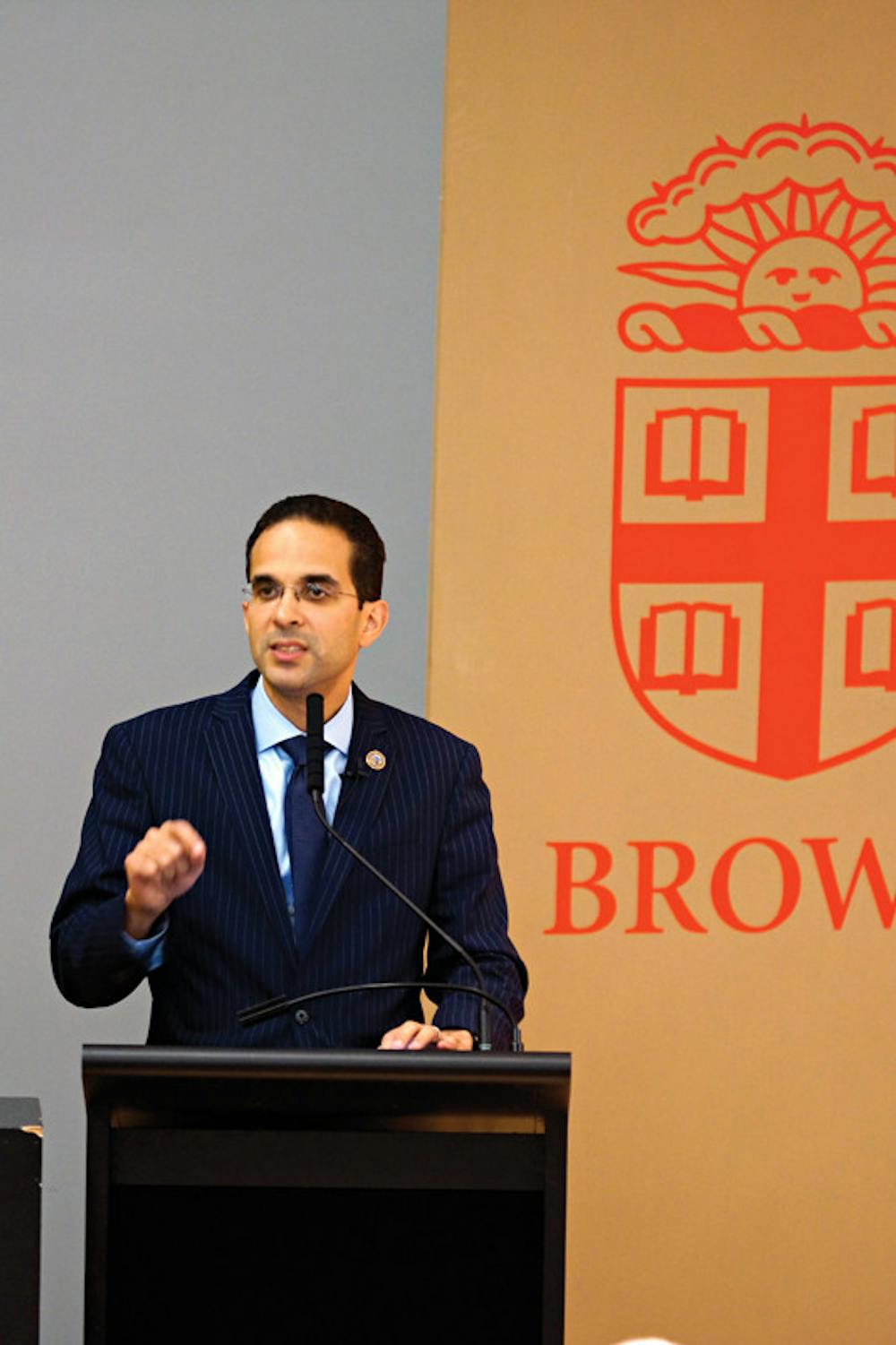Mayor Angel Taveras’ parents moved to New York from the Dominican Republic with eighth-grade educations, “looking for the American dream,” he told a crowd of students and community members in List 120 last night.
Taveras spoke about his experience as mayor of Providence during an event titled “Latino Mayors: Politics and Policy in the City” as part of this year’s Thomas Anton/Frederick Lippitt Conference on Urban Affairs.
Describing his childhood in Providence, Taveras said his aspirations of becoming a lawyer began when growing up on the South Side.
“I was able to go from Head Start to Harvard to Georgetown Law School,” he said, referring to the program that provides early education to low-income children.
As Providence’s first Latino mayor, Taveras had to combat the city’s severe fiscal challenges and navigate a difficult political climate, knowing all eyes were on him, he said.
He worked to offset the city’s $110 million structural deficit — which he referred to as a “Category 5 fiscal hurricane” — by negotiating city pension reform with unions, instituting budget cuts and soliciting greater contributions from tax-exempt institutions like Brown, he said. If the city had not reformed its pensions, “we’d be Detroit,” he said.
Taveras ran for Congress in 2000. Though he lost the race, his performance exceeded expectations, he said, and he nearly won the majority of Providence votes. His performance helped wake the “Latino sleeping giant,” he said.
Many Latino politicians fail in campaigns before they succeed, but Latinos are becoming more involved in politics and more successful in getting candidates elected, he added.
In the 2012 presidential election, President Obama won 71 percent of the Latino vote, which helped carry him to the presidency, Taveras said.
Despite this, Latinos are still underrepresented in city halls across the country, he said.
“Latinos are not a monolithic group,” Taveras said, adding that the state’s Latinos come from a variety of backgrounds and countries like the Dominican Republic, Guatemala, Venezuela and Mexico. Given these diverse origins, Latino politicians must find ways to come together in order to achieve political prominence, he said. “I dance merengue, and I try to dance salsa, too,” he joked.
“I am a Latino but that’s not all that I am,” he said. “If you have a vision that is broad and that appeals to people, you can get votes from all across the city.”
In response to a question about how his background has informed his work as mayor, Taveras said he brings a valuable perspective on the struggles many of his constituents face. He said he understands the experience of living in public housing because his family lived in public housing during his youth.
As someone who did not have access to summer programs as a child, he said he understands how vital summer programs are for children.
When he began repaving damaged roads in Providence, he said he decided to start with roads on the South Side because of the perception that it is an often-neglected area.
“I knew it would make a difference to people,” he added.
Following Taveras’ keynote address, a panel discussed Latino politics in Rhode Island.
The Census Bureau projects that by 2043, America’s white population will dip below 50 percent for the first time, and a large portion of the population will be Latino, said Tony Affigne, visiting professor of American studies at Brown and political science professor at Providence College. Latinos are an increasingly important demographic in American politics and already play a large role in elections, he added.
“Almost universal” support from Latinos helped Ralph Mollis win reelection as Secretary of State in 2010, Affigne said, adding, “That kind of swing role in Rhode Island politics is the future for Latinos.”
The Rhode Island Latino Political Action Committee has played a pivotal role in shaping Latino politics in the state, said Pablo Rodriguez, president of Latino Public Radio. It’s possible for such a diverse and multicultural organization to exist because of the unique makeup of Rhode Island’s Latino population, he added. In contrast to other states, Rhode Island’s Latino base is not dominated by immigrants from any one country and most of the immigrants arrived in the United States around the same time, he said.
But the state’s Latinos also face many challenges and “inequalities across the board,” said Doris De Los Santos, former president of the Rhode Island Latino Political Action Committee. “Education is at the crux of all the problems that we face,” she said.
The state has one of the largest achievement gaps between white and Latino students in the country, Rodriguez said.
Until this educational disparity is addressed, the country will not be able to “unleash the full potential of Latino communities,” De Los Santos added. All Americans should be concerned with this problem, she said. Though electing more Latinos into office is an important step, doing so will not automatically end systemic inequalities, she said.
De Los Santos also stressed the importance of Latina women’s roles in politics, calling them the “backbone” of many elected officials.
“I want to take this time to challenge Latinas to be more active in the forefront,” she said.
James Diossa, the 27-year-old mayor of Central Falls, spoke about the unique challenges of getting Latinos to vote in his city, where voter turnout is especially low.
Manuel Contreras ’16 said he was glad the talk focused on Latino politics throughout the entire state. “It is really easy to think that Brown is just on College Hill or in Providence. We forget that it’s in Rhode Island, too,” he said.
Kendra Cornejo ’15 said she found the talk informative, especially the discussion by the panel members.

ADVERTISEMENT




